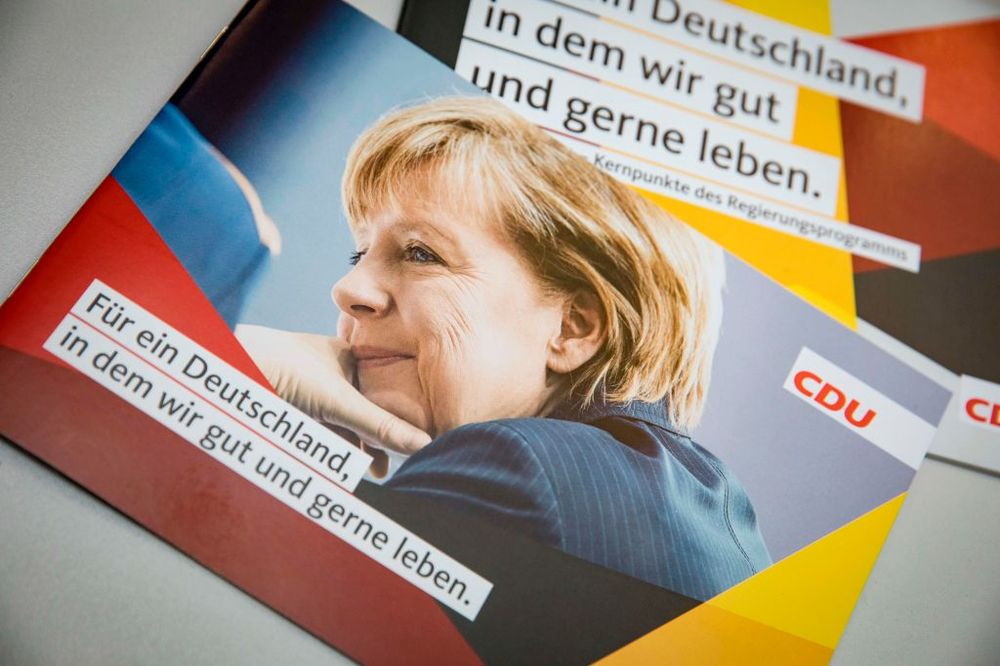Germany’s September election is like no other the Western world has seen in the last two years. As the leading candidate, Chancellor Angela Merkel, relaxed on a three-week vacation, her top challenger, Social Democrat Martin Schulz, worked the campaign trail furiously — but that only got him into deeper trouble. His party has now lost its majority in yet another German state, just as it was revealed that the state’s Social Democrat first minister had allowed Volkswagen to edit his speech about the company’s emissions scandal.
Whether or not it’s an election year, Merkel unfailingly goes on a three-week vacation in late July. Like many Germans she returns to the same spot every year; in her case, hiking in the South Tyrol, Italy’s German-speaking province. The pictures are similar every year, down to the cap Merkel likes to wear on her hikes.
Meanwhile, her rival, the indefatigable former European Parliament speaker, has crisscrossed the country, holding rallies and party events. Since his party has spent the last four years as the junior coalition partner of Merkel’s Christian Democrats, Schulz is working to stress their differences. He talks about social justice, tenants’ rights, mandatory infrastructure investment, an end to Germany’s North Atlantic Treaty Organization commitment to spend 2 percent of economic output on defense. He takes a harder line on German carmakers in the wake of their scandals.
It doesn’t seem to be helping. The CDU’s formidable poll advantage has held. And, as the chancellor’s Tyrol idyll drew to a close, Schulz found himself picking up the pieces from a political crash in Lower Saxony, an important state with about 10 percent of Germany’s population.
In the 2013 state election there, Merkel’s CDU fell just short of being able to form a coalition; instead, the SPD joined up with the Greens, which gave them a one-seat majority. Stephan Weil, the state SPD leader, became first minister — and took a seat on the supervisory board of Volkswagen, which is headquartered in Lower Saxony and has the state as its second-largest shareholder.
On Friday, all hell broke loose. A 20-year veteran of the Green Party, Elke Twesten, who had long had conservative leanings, announced she was leaving the party for the CDU. The CDU apparently started working on her just after she lost a primary vote in June; but she considered the initial approaches “immoral.” By the time she was ripe for the switch, the general election was less than two months away.
Outrage among Green and SPD politicians and supporters ensued: The CDU was accused of “buying” Twesten. But the legislator had taken the plunge and the ruling coalition no longer had a majority. Rather than hang on with a minority government until January 2018, Weil decided to call an early election. It may take place on Sept. 24, simultaneously with the national one, and Weil will have trouble improving on his party’s 2013 performance.
He is embroiled in a fresh scandal of his own after the tabloid Bild reported that Weil had allowed Volkswagen to censor an October 2015 speech about its diesel emissions scandal. The first minister argued that he’d only done that for fact-checking purposes and that all the harsh criticism he had intended to level at VW remained in the text. But now that Weil’s office has released the speech, tracked changes and all, it’s clear that wasn’t quite the case. Weil refused to soften a sentence accusing VW of manipulating emissions data for many years (the carmaker suggested adding “during tests”) — but he did soften a harsher sentence that originally said, “Volkswagen thus broke the law and abused trust.” The edited version read, “Thus, the law was broken and trust abused.”
The closeness between the CDU and the car industry was supposed to be a handicap for Merkel’s party; but now the tables have suddenly been turned and voters — in Lower Saxony and elsewhere in Germany — were deftly reminded that the scandal in Volkswagen-land took place on the SPD’s watch. Lower Saxony also is the home state of many prominent SPD politicians, including Foreign Minister Sigmar Gabriel — the party’s top official in the ruling coalition.
The CDU seized the initiative from a seemingly resurgent SPD this year by winning three state elections in a row. Lower Saxony’s looks set to be a fourth. Merkel seems to have played her hand flawlessly. As Jacques Schuster wrote in Die Welt, “through silence and absence, she has made sure all of her competitor’s blows land on cotton wool.”
As Merkel returns from vacation for the final stretch of a campaign in which she’s played a masterful defensive game, her biggest challenge is to figure out the shape of the future ruling coalition. Continuing on with the SPD is not her preferred option, although she could probably make peace with Schulz. The Greens are not a reliable partner: Too few of its members are like Twesten. And the leader of the liberal Free Democrats, a traditional CDU coalition partner, Christian Lindner, appears to be excessively hungry for the limelight — and besides, polls show the CDU and the FDP may not have a majority together in September.
By German standards, though, there’s still plenty of time to work out an alliance. Merkel will concentrate on equaling or beating her 2013 result, when her party won 41.5 percent of the vote. She is certainly on track to do so.
Bloomberg
